#mycroft is so much less chaotic than his brother
Explore tagged Tumblr posts
Text
both Sherlock and Mycroft have autism, but only Sherlock has ADHD, imo
#mine#based on their vibes#mycroft is so much less chaotic than his brother#mycroft has it all together whereas sherlock is a mess. thats peak audhd for you#sherlock holmes#acd canon#acd sherlock holmes#acd holmes#mycroft holmes
74 notes
·
View notes
Text
Engage My Services (Sherlock Holmes x Reader) [Request]
Oooohhhh I have an idea for you: Arranged Marriage and Sherlock Holmes. He doesn’t have to be the one in the match 😉—Requested by @inlovewithhisblueeyes
Part 1 | Part 2
Warnings: none

Gif Source: henrycavilledits
Horror. Absolute horror.
It curdled your stomach and turned everything sour from your guts to the taste on your dry tongue. Nevermind that it had been nearly forty-eight hours since you had been given the devastating news.
Marriage. Without your consent, no less.
It had taken you two days to determine what to do. No amount of putting your foot down had prevented your parents from changing their stubborn minds.
Which is how you found yourself in Sherlock’s chaotic sitting room.
His landlady should have been present, it being a bit inappropriate for you to be in his flat alone, but you were a slight exception. After all, you had known Sherlock and his brother for years thanks to your father’s insistence on attending social engagements. Mycroft had dragged his brother to several of them, and given that you both were of the same mindset when it came to the frivolous festivities, you both had come to an easy familiarity.
It was, however, the first time you had been to his flat.
The chaos had a method, you were sure, but looking at it, you couldn’t quite discern it. Sherlock, unaccustomed to visitors, swept broadsheets off a dusty chair and gestured for you to sit.
“What can I do for you?” he asked, perplexed. As much as the man was a detective, when it came to emotional matters, he was rather dense. As far as he could tell, you were agitated. But no matter what his deductive faculties told him—that you had arrived in a hansom rather than your family’s cab without rushing despite some urgency in your bearing—he couldn’t determine what it was that had you so upset.
“My progenitors”—you only bandied that term around when you were displeased with them—“have decided to wed me off to an unspeakable suitor.”
Sherlock stilled in his seat, but you took no notice. Wringing your gloves in your hands, you struggled to collect yourself. You were doing a poor job of it, feeling an enraged flush combating your shocked pallor.
“They refuse to allow me to reject the proposal,” you continued, visibly shaking. “But Lord Worthington is a brute, and they refuse to see it. They would rather marry me off to a devil for the social station.”
Gripping your gloves with renewed vehemence, you glanced up at Sherlock. He stared at you curiously, a furrow in his normally smooth brow. The muscle in his jaw twitched.
“You want me to find proof,” he finally said, his voice low and quiet.
“Yes. Proof that shows them he is unsuitable.”
Sherlock lapsed into silence. Fidgeting under his heavy gaze, you frowned, trying to read him.
“I know this isn’t your usual milieu—it isn’t stimulating, I know—but you are the one person who could find proof.” You glanced down at your poorly abused gloves. “You’re the only person who would ever help me.”
“I shall.”
Jerking your head up, you met his suddenly averted gaze in surprise. “Thank you, Sherlock.”
“You should go so I may begin my work.” The words came out clipped, curt.
Perplexed by his strange manner, you acquiesced, afraid he might change his mind if you lingered. You left his flat with cautiously raised spirits.
~~
“We have no choice but to reject the proposal,” your mother whispered. “This is…”
“Damning,” your father finished. “Absolutely damning. Why have we not heard of this before?”
You did, you thought savagely from your position on the stairs, but you didn’t heed me.
Sherlock had arrived some ten minutes before to deliver to your parents the proof of Lord Worthington’s damned nature. You had snuck downstairs to eavesdrop on the conversation. Sherlock hadn’t had much to say except that when he had heard of the engagement, he had been appalled that so disreputable a man had been given even a modicum of courtesy. Then he had left.
As your parents panicked over their near-mistake, you hastened back up the stairs and took the narrow servants’ stairs down to the kitchen. You could possibly catch up to Sherlock before he hailed a cab. You stepped through the door leading to the outside.
Sherlock waited by it, startling you with his unexpected presence.
“Thank you!” you cried when your composure returned. “I am blessedly unfettered now.”
He shifted on his feet, his hands in his pockets. “You deserve better than a bastard like Worthington.”
You laughed despite being surprised by his language. “A bastard indeed.”
He blinked, equally shocked to hear the same word pass your lips. Smiling broadly, you nearly enveloped him in a crushing hug. Your joy radiated from you in palpable waves as you beamed at him.
Adjusting his collar, Sherlock smiled back for a moment. It passed as quickly as it had arrived.
“What is it?” you asked, feeling your happiness slip a fraction.
“I take it that your joy is only being relieved of Lord Worthington.”
“Yes, of course.”
“Not…not being unwed.”
You frowned. “I am happy to be free at this moment, but that is not to say that I am loathe to marry, if that is what you mean.”
He nodded, the somber look on his face lightening a fraction. “That is good.”
Before you could ask why, he ducked his head in a slight bow.
“I am happy to have been of service. Please do not hesitate to engage my services again.”
You struggled to hold onto your joy as he left, wondering why the exchange felt so strange and why you felt curiously disappointed he hadn’t lingered longer.
#Sherlock Holmes x Reader#Sherlock Holmes#Sherlock Holmes imagine#Henry Cavill x Reader#Henry Cavill#Henry Cavill imagine#Enola Holmes#Henry Cavill Sherlock#Henry!Sherlock#Henry!Holmes#requests
2K notes
·
View notes
Text
"Sherlock!" Mycroft's voice boomed through the large Holmes manor, echoing off the pristine walls as he climbed the steps to the one messy room in the whole building.
Sherlock didn't allow his room to be cleaned, not by himself, by his parents, or by any help they hired. Everything was in it's own chaotic order. Though he didn't understand his little brother's ways, Mycroft was the only one who didn't pressure him about it, at the perfect age to remember and respect childhood with the maturity and responsibility of an adult.
That wasn't what people usually thought of, however, when they thought of Mycroft Holmes. They thought of a tall, sharp eyed, incredibly smart young man who spoke little other than curt interactions when absolutely necessary. That's what every teacher, classmate, acquaintance, and family member had known since he was very little. All asked where he had gotten it from. His mother was very social and energetic, well known for her friendship and generosity as well as her smarts. His father was a little more private, often shy about his feelings and thoughts but never to the extent of his sons. The only person who didn't know him like this, was his younger brother. Sherlock Holmes.
Sherlock Holmes, the younger of the two Holmes brothers, was a strange boy as well. He was younger than Mycroft by seven years, and very much in his shadow. Sherlock didn't have the kind of oddness that was useful or particularly extraordinary like Mycroft. Or perhaps the novelty had just worn off. He wasn't as intelligent as his elder brother, as tidy, as eloquent. Sherlock spent the hours he wasn't at school in his room, always fussing with one science experiment or another, rarely engaging in conversation at all, even more so than Mycroft, who still spoke when it was considered polite. Sherlock gave little care to social standards like manners and rules, often called rude and arrogant, even at such a young age.
These two boys, one soon to become an adult, the other soon to become a teen. One, Mycroft, had inherited his father's rusty red hair and shorter build, though not at all small. The other boy had much more distinctive features, ones that singled him out more than he already was. Pale, nearly white skin against dark black curls and startling icy blue-green eyes. Tall and thin and startling cheekbones for a child of only ten. Oh how he envied his brother, with his standard height and less drastic skin-hair contrast and his normal eye color, no matter how dead inside they looked.
But that's how they were, two extraordinary people living in a world that wasn't ready for them. And when the world isn't ready for you, it tries to push you back into the little hole from which you came. Of course, that is a tedious and painful task, one which both boys, but mostly Sherlock, knew very well.
It was the art of being mean.
Most people thought of Sherlock as a mean, irritable, and generally unpleasant person. They never thought of why. That was something only one other person understood. That person was Mycroft Holmes.
Let me know if you want me to continue this. It was just a short little thing about the Holmes bros, not proof read, just felt like a little tribute could come from my writers block cure activities.
16 notes
·
View notes
Text
Sherlock Holmes and His Inability to Survive Lockdown
"Sherlock," I groaned, "You can't keep doing this. Rosie's not gonna tolerate it forever, you know."
"That, John, is inconsequential to me in this moment. Simply paltry. Entirely-"
I jerked, sitting up from the hardwood floor of 221B Baker Street he'd had myself and my daughter playing dead on for what must've been 20 minutes- but felt like hours.
"Alright, Sherlock, you've made your point."
"Daddy," hummed Rosie, "Lie down. We're dead, remember?"
In that moment I earnestly wished I was. I laid down again; equally compliant and disgruntled. Sherlock hadn't been coping well since England had announced the government sanctioned lockdown. Or rather, the Mycroft sanctioned lockdown. He contacted me briefly before giving the executive order, in the name of warning me of just how poorly his brother fares in confinement.
I should have listened. Got him some video games or something. Instead I focused on the practical things, like stocking the flat with toilet paper and canned goods. Like an idiot.
Regardless of the fortitude of this flat, it had become a cage. All of Sherlock's cases left incomplete. What becomes of a field agent when the field is closed? The answer: he becomes a complete madman. He'd (of course) remembered every infinitesimal detail of each case, and translated it into our flat. Down to the minutiae. Today, the strange case of the murdered man, and the murdered murderer.
Rosie lay "dead" face down, with a questionable ketchup stab wound on her little back. I lay next to her, wielding the murder weapon (a bread-stick blade) but equivalently deceased. Nobody at Scotland Yard could decipher how the murderer came to be murdered. Hence, Sherlock was on the case. Or at least, until the crime scene was cordoned off- with the rest of the bloody country.
As I clutched the bread in between my weary fingers, I noticed that I felt less vibration in the floor. After pacing around the two Watsons, while imagining we were corpses (lovely, of course), he'd finally stopped.
"Figured it out, have you?" I pleaded, my back screaming to be stretched.
"Mm. Yes. It appears I have."
"Go on then. What happened?"
"What happened you ask?"
Oh dear. What the hell did I ask that for, I thought to myself.
Sherlock continued, "It has occurred to me that in lieu of making any real progress on this case, I have been thinking of nothing other than your untimely demise."
"Sherlock?" I stood up sharply. Too sharply. My God, I'm getting too old for this. "What's up with you? Why would you say something like-"
"Because, John. Because I can't protect you from this. This disease. For the first time, I am rendered utterly and miserably powerless to protect you. Both of you." He scooped up the toddler-shaped body from the floor and set her down gently on his armchair. I'm going to have to clean the ketchup off that later. I wonder if Mrs Hudson has any baking soda around.
I wanted to ask why he'd let us remain on the floor all this time while he fretting internally. Instead, I looked up into his eyes. Striking blue. Terrible pain. Genuine fear.
"John, I've seen many bodies. Though they escape my thoughts, the abstractation of death itself lingers in my veins like a bad high. It's completely exhilarating to live, and exhausting to not die. I don't fear death. I fear losing you."
I kept silent. I had to think. This notion had come from nowhere. Or had it? Had I been ignorant to his pain, and allowed it to manifest only now when he has nothing to distract himself from it? Mycroft was right.
"Sherlock you can't protect me from this disease, nor can you protect Rosie, Molly, Mrs Hudson or even Greg." He puzzled. "Lestrade." I corrected myself. "You can't stop the virus."
"Thank you John, I feel so much better" He huffed sarcastically, before trotting into the laboratory-kitchen in the fashion of a petty yet troubled teen.
"I'm not done. What I mean to say is, while you can't protect us right now, I hope you know that we appreciate you for your efforts."
"What efforts?"
"This." I gestured to the tape on the floor, in the shape of two dead people I'd never heard of until today. I extended this gesture to the files pinned to the fleur-de-lis wallpaper. The red string woven through the lives of the afflicted and the deaths of the dismissed. "All these cases you're trying to solve in lockdown."
"Well, John-"
"Still not done, Sherlock." I'd caught on. "I know what you're doing. None of these cases are real are they? You're trying to keep us busy so we don't worry like you. Imposing your chaotic coping methods on us."
Admittedly, I was touched. Despite the fact that regrettably, my sporadic intellect had startled him. He's definitely suffering if he'd formulated a plan even I could crack.
He switched off the three roaring bunsen burners he'd had going on the dining table and rejoined me in the living room. "Was it that obvious?"
"As obvious as the fake blood on Rosie's cardigan" I chuckled.
"Oh, erm. Actually,"
"Sherlock?"
"Well you see,"
"Sherlock don't tell me that's real blood you've splattered on my child."
"It's for the case!"
"SHERLOCK?!"
#sherlock holmes#john watson#sherlock#johnlock#benedict cumberbatch#221b baker street#221b johnlock#Lockdown#Coronavirus#covid 19#sherlock fanfic#fan fic#fanfic#ficlet#martin freeman#molly hooper#greg lestrade#mycroft#sherlock and mycroft
267 notes
·
View notes
Text
John Watson x Reader II
“That’s erm,” your hands fluttered nervously at your side, “well, that’s quite a lot to unpack isn’t it?”
“I didn’t want to have to tell you but,” he grimaced, “I thought you deserved to know.”
John stared at you, his blue gaze passing through you into another plane of thought. He was acutely aware of the pain he had just inflicted on you. The behemoth of emotional injury that had been transferred onto your shoulders.
He didn’t want to. So why had he? Why had he chosen to burden this perfectly sane woman with his imperfectly chaotic life?
He waited to see how you would react. Would you collapse into a nervous mess? Cry and scream at him for crippling you with this knowledge? Leave in a flurry of expletives never to be seen again?
That was, after all, how any sane person would react when presented with the morbid chronicles of John Watson’s life. The soldier who never came home from the war. The man who sought adrenaline in the form of chasing after killers and putting bullets into those who would do the same to him. His only friend was a high functioning sociopath and his only wife had been a liar of considerable proportions who he’d lost just as soon as he’d gotten to know her.
He was not sane, as certain people had been quite eager to remind him, so he had come to accept these things as part of the fabric of himself. The threads that wove him together.
You, however, were sane. Ordinary and simple in all the best ways, just as he had always wanted his lover to be. You had no bones in your closet, no demons in your bed. Just a beautiful smile and an incredible laugh that had captured his heart with breathless desire.
Six months he’d fallen asleep with you by his side and now he had to let you go. It wasn’t meant to be. How could it? He didn’t fall in love with normal people. The ring he still wore on his finger proved as much.
He stood firm, and braced himself for your blows. With a sick sort of humor he realized he wanted to be punished. He wanted you to curse his name for ever dragging you into his demented life. He wanted you to leave him because otherwise, he knew, he would beg you to stay.
“So, let me make sure I understand you correctly,” you began to pace as you listed off the number of inconceivable truths you had just learned about your boyfriend.
“Your best friend is Sherlock Holmes, who has almost gotten you killed a dozen or more times and encourages reckless behavior on your part that is usually illegal. Your acquaintance is his brother, Mycroft Holmes, who is no less dangerous if slightly more nefarious, and he enlists your help on equally deadly tasks with little to no concern for your life. Your wife was actually a covert operative whom you met while you thought Sherlock was dead, but it turns out he wasn’t and she ended up taking a bullet for this man not long after your child was born.”
You paused and glanced up at John, his face was downcast.
“Did I forget anything?”
“No,” he clenched and unclenched his fists. It was a habit of his you found strangely endearing, “that would be everything.”
“Well,” you exhaled deeply, “here I was fretting about how to tell you that I spent a summer in Florence sampling wine and Italian men when I supposed to be studying agriculture. That all seems a bit humdrum now, doesn’t it?”
Surprise and confusion flitted over his face. He hadn’t quite processed the joke yet.
“It was during my Uni years,” you shrugged, “I worried it might make you think I was a bit too--shall we say--flighty.”
A chuckled escaped his lips and his eyes sought yours with a desperate intensity. Laughter bubbled in your chest and soon the two of you were doubled over with the absurdity of it all.
When your breath returned, you smiled and righted a lock of hair that had fallen over his forehead.
“It’s a tad unfair though,” you mused,
“What is?” his brow furrowed.
“Telling me all this after I’d already fallen in love with you. Now I haven’t got a choice but to stick around.”
John was speechless. This couldn’t be right. He didn’t understand. You weren’t supposed to be this understanding, it wasn’t supposed to feel this easy.
He searched your face for any trace of misgiving, not that he was very good at it. That was more Sherlock’s territory. Still, he could find nothing but fondness and compassion in your image. He was nearly ready to let himself believe it.
Once you eliminate the impossible, whatever remains, no matter how improbable, must be the truth.
His arms sought you, enveloping your frame as he wanted--needed--to feel you against him. He kissed your temple and whispered, “Thank you.”
You were truthfully more than a little shocked by everything, but you would have time to process it more thoroughly later. John had entrusted his most painful moments with you and you would treat them with all the care and tenderness that someone as incredible as he deserved.
After a moment you pulled back and gave him a playful smile, “Now, you’re sure there’s nothing else? Rosie isn’t actually a forest nymph that was left on your doorstep?”
He feigned disappointment, “Ah, I was hoping you wouldn’t notice that one.”
His hands slipped down to your waist and his expression was curious, “About that summer in Italy. Is there, erm, anything you learned that you want to share with me?”
You kissed him lightly, testing his patience, “Oh, yes I can think of a few things.”
His eyes were bright with amusement as he captured your mouth with his own once again.
Perhaps you were not sane after all. Perhaps you were. All John Watson knew for certain was that he loved you and that was enough.
__________
Part 2 of ?
5 notes
·
View notes
Text
The End of Civilization and Other Pitfalls of Domesticity
"I've never been very good with them," Mycroft had said.
"Babies?" Sherlock had asked.
The British Government had wrinkled his nose and clarified, "Humans."
That attitude had been all well and fine and easily maintained while Mary was alive, but afterward...well, John moved back to 221B with his little girl, didn't he, and then any time Mycroft needed Sherlock, the child was always underfoot, like a sticky wad of bubblegum.
And irritatingly, Sherlock answered his phone less and less, necessitating car rides to 221B both day and night if Mycroft wished to get his little brother's attention at all. Because, of course, said attention had to be wrangled away from John and the baby (Rosamund; he had committed the name to memory against his will).
Rosie, as she was affectionately known around the household, was a very small thing who necessitated the use of a chaotic amalgamation of other things, such as diapers and dummies and food stuffs and rattles and creams and it was all just so much NOISE.
And, for some reason, she liked him. Rosie, that was, the child--this Rosamund Watson--liked Mycroft. He couldn't fathom why.
Few things are more stubborn than little girls who have taken an interest in something. She liked to first paw at, and then--as she grew--cling to, and eventually climb him whenever he sat. It was like visiting the zoo to see the monkeys and unexpectedly becoming the tree.
It is impossible to set a toddler aside as one would a tea cup. Again, such a tactic results in a most unacceptable level of noise. Eventually Mycroft, a broken shell of his former concrete self, was forced to admit that any foreign government looking to infiltrate and monitor its enemy country covertly would be wisest to send in its Trojan horse in the form of a tiny blonde Watson.
Mr. All-hearts-are-broken, Mr. Don't-get-involved, Mr. Ice Man, Mr. The-only-one-I've-ever-held-hands-with-is-my-umbrella, made a fatal error one day when he offered the child a sweet (which he most certainly had not slipped into his pocket from the dish in his office with that very intention in mind). The look on the child's face--widening of the already-wide navy blue eyes, taking in his face with rejuvenated adoration--had effectively tossed rock salt onto the ice ball in his chest. It had also proven to Rosie that all her intuitions were not misguided. And thus, civilizations have fallen.
What followed was the most demeaning, degrading, humiliating evolution of Mycroft's character that he could ever have once imagined. He would come away from 221B covered in finger paint and unicorn stickers. (On one particularly memorable afternoon Mycroft, having stepped outside with some foreign diplomats following a tentative but satisfactory meeting to join them for a smoke, opened his umbrella under the afternoon's gloom only to be showered with several cups worth of rainbow glitter. And had laughed!)
One evening John and Sherlock arrived home from a date (yes, that had begun, long before stated evening) and were shocked from their revoltingly amorous attitudes by the sight of Mycroft, who had relieved Molly as the designated sitter. He was seated on a frilly purple blanket on the floor of the lounge, having a tea-and-cupcake-and-feather-boa party with the precocious four-year-old. Both were sipping imaginary liquid from their cups with great sophistication and dignity.
Mycroft didn't even pretend not to be engrossed in the game of make-believe. He shooed the other men away impatiently, telling them they had not been invited. Rosie found the idea of her fathers, who in her mind ruled all of time and space, not being invited to anything uproariously funny. For weeks afterward she uninvited them to all manner of things: dinner, bath time, goodnight tickles.
And so that is the story of how Mycroft "East Wind" Holmes became swept along in the domesticity one Sherlock Holmes and one John Watson created in a little flat on Baker Street, changing him irrevocably from The British Government to Uncle Mycroft.
Which, as it turned out, he was pretty good at being.
----------------------------------------------
Thanks for reading! I am goingdownin221b on the AO3.
#johnlock#sherlock#mycroft#mycroft holmes#rosie watson#rosamund watson#uncle mycroft#ficlet#flufflet#fluff#domesticity in 221b
40 notes
·
View notes
Text
What happened to Sherlock? Part VII – The Importance of Being Earnest (2)
This is the direct (and lengthy) continuation of Part VII in my meta series “What happened to Sherlock?”. You can find the first post of this installment here. I’m now going to continue testing my Hypothesis #7, which goes like this:
Hypothesis #7. By TFP Sherlock has managed to figure out some essential things about John and the importance of staying alive, and he has managed to get in touch with his own repressed emotions.
In the first post I tried to verify the two first statements of this hypothesis, and here I’ll focus on the third statement about repressed emotions. After the hug in TLD, Therapist!Sherlock (assuming Eurus=Sherlock) thought that John felt ‘so much better’. But then Detective!Sherlock noticed that something was still wrong; his client seemed to be channelling Satan and Faith’s note was actually ‘real’. The scenario ended with Therapist!Sherlock shooting John in the face, but in TFP we learn that this was done with a tranquilizer, so John survived. Which brings us right into:
Prediction #2: If Hypothesis #7 is true, Sherlock will have to confront his childhood trauma and the context where he chose to repress his emotions.
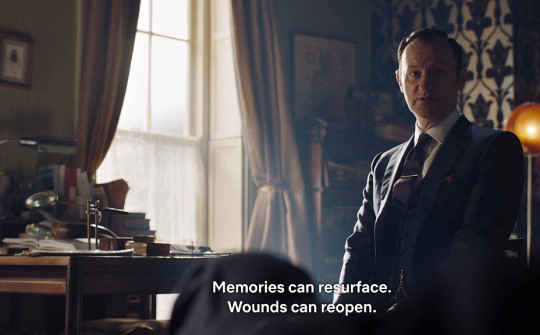
Sherlock really needs to stay alive for John’s sake. But how can you stay alive when Emotions are killing you? Sherlock might think the only solution is to bring them on and face them, try to beat them ‘in a death-defying act’. Which means Sherlock must go deeper still into his own mind, to face his demons.
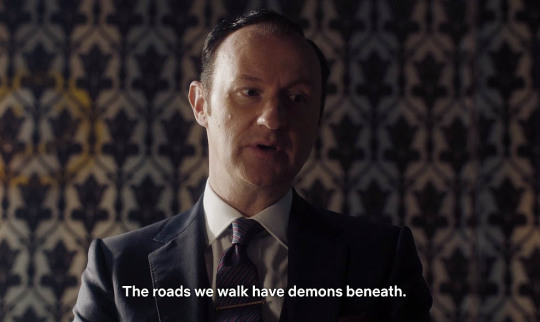
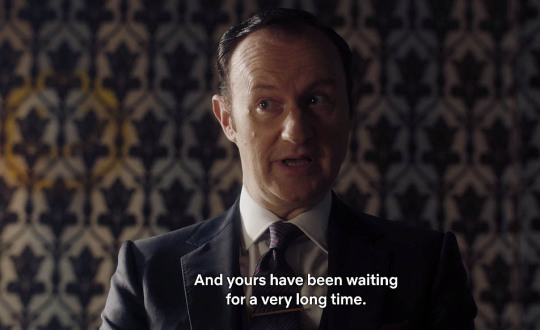
i actually think this is the single bravest thing Sherlock does in the whole show this far. And in order to face his demons and traumatic memories, he needs to perform his Mind Theatre experiments on himself. But who’s the scientist then - who is setting up the experiments? I believe this is done by Sherlock letting someone impersonate a side of himself that he has been hiding and neglecting for a very long time, and who therefore appears to be a cold, calculating psychopath to be feared and avoided: Sister Sentiment.
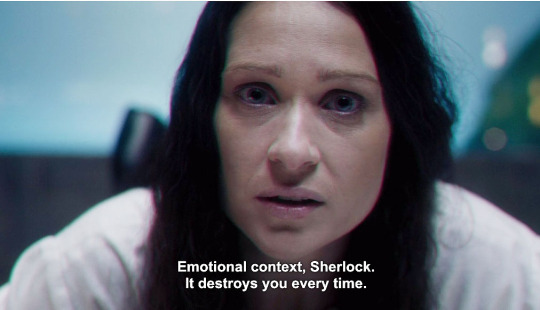
@beingallmysterious said it in their very brilliant meta about Eurus representing Emotion (my bolding, the link also contains the additions):
“The final problem then is reason vs sentiment. How do we live with emotions? Should we lock them up as Mycroft recommends? Sherlock has tried this and it didn’t work. So what’s Sherlock’s solution in the end? He lives with her. He accepts her. He becomes whole again. Reason and sentiment”.
This is, basically, what I think TFP is about. Sherlock might believe he has to defeat and disarm Eurus, but this story tells him (and us) that he rather has to embrace her, accept her as a valid part of himself. So let’s keep on running the scenarios.
TFP, Scenario 1: What happened back then?
Inspiration: It seems like this scenario starts when Mycroft is forced to talk about his and Sherlock’s upbringing and their ‘lost sister’ Eurus. We go back to their childhood and the mansion where the Holmes family used to live. So some of this might be based upon Sherlock’s real memories. But there’s also a resemblance to certain horror movies, which I doubt is a coincidence. I rather believe this is Sherlock’s way of deflecting traumatic memories he’d rather not get into. He uses characters from these movies as ‘actors’, with scary, supernatural powers representing Eurus, such as Orphan:
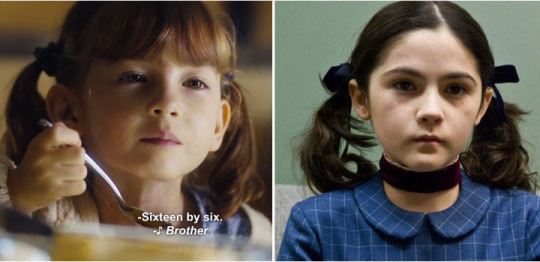
Or The Ring:
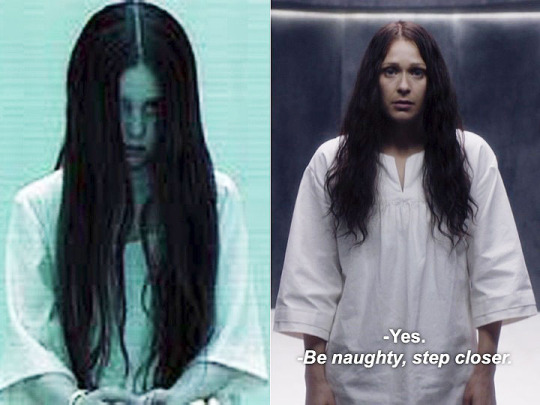
As a bonus, this girl from The Ring (Samara is her name, by the way) also happens to come out of a well (see discussion on the 5th scenario of TFP at the end of this post) and she climbs through the screen of the telly, a bit like Eurus slips through the suddenly non-existent glass wall at Sherrinford.
[Running a scenario where Sherlock and John scare Mycroft into telling the truth about their childhood, when Sherlock used to play pirates with his dog while little Eurus played alone, and they had ‘honey for tea’ at Musgrave Hall. But Eurus seemed to want Sherlock dead and set the mansion on fire, and in present time 221B gets blown up by Eurus’ ‘patience grenade’]
Result: We learn that little Eurus (=Sherlock) set the house on fire and was then ‘taken away’ to some un-named ‘suitable place’, where she started a new fire. And then Uncle Rudy ‘took care of things’; she was declared dead but secretly sent to Sherrinford. In spite of all the absurd creepiness (bizarre clowns, explosions etc), present day Sherlock’s search for his sister leads them to Sherrinford, an isolated prison island way out at sea, where she is (supposedly) locked up. And since John was only sedated at the end of TLD, he’s now with Sherlock again. But well there, the nightmare continues; Sister Sentiment takes over their free will pretty quickly.
Discussion: @sagestreet has made an interesting analysis based on the idea that the memory sticks that keep popping up every now and then in the show represent Sherlock’s “’lost’ memory (about his traumatic past and subsequently repressed gay identity)” @sagestreet theorizes that this ‘lost’ memory might be based on the experience that “Sherlock’s dad was in a gay relationship with his best friend and something went very, very wrong”. And, furthermore, what if this friend was ‘Uncle Rudy’, possibly the brother of Sherlock’s mother?
This idea would be interesting to explore further, and I replied to @sagestreet‘s meta with some more speculation: A triangle drama like this might have had an emotional impact on the kids, perhaps enough to make the older Mycroft ‘abandon’ his own feelings and try to make his little brother do the same. But if little Sherlock (=Eurus) had a too emotional personality to even manage to distinguish one feeling from the other in this mess...
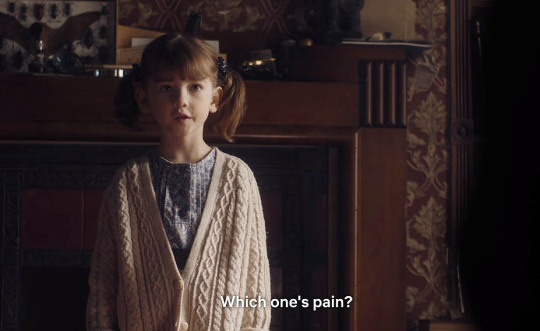
...he might have confused the situation of jealousy, guilt, anger, betrayal etc. in the family with his Dad’s sexual orientation. And it all might have been mixed up into internalized homophobia, where Sherlock would blame himself for having the same kind of feelings as his Dad, which would make him think he risked dragging others into pain and misery.
So what did actually happen? I don’t think we (and Sherlock) really get the answers in TFP, but we do get to feel some of the emotions connected to it, and that’s at least a beginning. Was there a suicide in Sherlock’s family, connected to a possible triangle drama? Or was an impending ‘scandal’ with secret-keeping in a chaotic family situation enough to mess up Sherlock’s emotional life? Was young Sherlock sent to a boarding school? Mental institution? Well, I do hope S5 will offer satisfactory answers to this.
TFP, Scenario 2: Is caring an advantage?
Inspiration: I think this is a key question for Sherlock, something he has been mulling over since he realized that his attitude doesn’t sit well with John, and maybe was the last straw in making John abandon him for someone else. John has been questioning Sherlock’s humanity at least since TGG, and possibly even earlier. If Sherlock did indeed ruin himself on drugs while reading John’s blog after the wedding (as I suggested earlier in this meta series), I think it’s relevant that this is how he came across on the blog after TGG:


So yes - this is one of the main problems that Sherlock needs to investigate in his Mind Theatre to find out what went wrong between him and John.
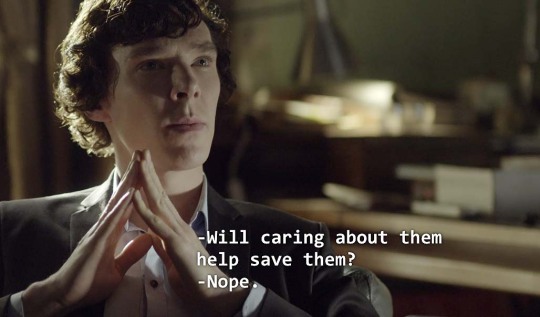
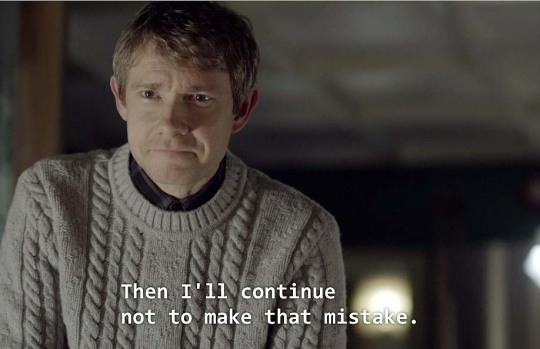
But Sherlock’s statement is contradictory (which I believe John tends to miss, at least consciously). Because trying to save people’s lives already means caring. Sherlock’s actions prove that he already does care about people - why otherwise would he work on crime solving? There are many less humanity-serving ‘games’ he could play and puzzles he could solve to keep himself entertained. So Sherlock definitely does care, but I think his real problem is that he doesn’t permit himself to feel it. Because feeling compassion means exposing himself to other people’s suffering - and his own. Sister Sentiment will make him suffer.
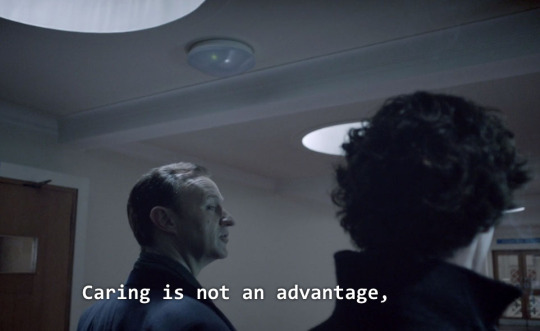
This is what Sherlock has been told, probably by Mycroft, in an attempt to protect his overly emotional little brother from the cruelty of life. The question is, though: Not an advantage for whom? Caring certainly is an advantage for the people you care about. It’s just that it might make you suffer.
[Running the scenario. For the first time in this story Sherlock exposes himself to his own experiments, rather than someone else. These are ethical dilemmas and he finally gets to the point where he’s sincere enough with himself to really face these demons. Because he used to hide from them before, which has deprived him of John. And - as @beingallmysterious said in their meta about Eurus - this is what Sentiment does to you: “Eurus puts Sherlock through torturous mind games. Doesn’t emotion do the exact same thing?” ]
Results and discussion: In Sister Sentiment’s first experiment Sherlock is supposed to make John shoot the Governor of Sherrinford, supposedly to stop Eurus from murdering his wife (which reminds me of a manipulation scheme from the mentalist Derren Brown (X). In his show ‘Push’ Brown tries to manipulate a guy, by group think and submission to authority figures, to ‘commit murder’ and push someone off a building). Sherlock seems very pragmatic about this; we don’t see him hesitate and he’s not even trying to refuse. He keeps playing entirely 'by the rules’:
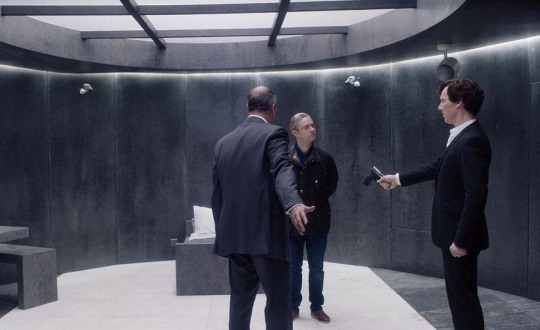
But what if the ‘rules’ are wrong? I think this mirrors how Sherlock, in a way, made John shoot the cabbie through the window in ASiP. If Sherlock had turned in the serial killer to the police instead of joining him to play mind games and prove himself clever, John wouldn’t have had to kill a person, which is a heavy weight to bear. In this scenario it gets clear that John doesn’t want to shoot someone, not even for the ‘greater good’. And in the end the Governor shoots himself to save his wife (who subsequently gets shot anyway). But the link to ASiP is clearly there, in my opinion; why else would they show us this bullet hole, which very much resembles the one where John shot the cabbie?

The next experiment is the three Garrideb brothers who are kept tied-up and dangling over the abyss. This is (supposedly) about solving a crime puzzle, and Sherlock quickly deduces who of the three brothers had committed the murder. But it doesn’t matter to Euros who the guilty is; she kills all three Garridebs anyway. Which resembles the result when Sherlock in TGG focuses a bit too much on the puzzles, without considering the victims (which enrages John). The blind lady had to spend a long time suffering in complete agony, so maybe she could no longer think clearly and started describing the criminal, who then detonated the bomb. Caring about the victim might have been an advantage for solving the case, and I think the important thing was that Sherlock’s cleverness wasn’t enough; the lady and a whole lot of other innocent people died anyway. But at least his compassion might have lessened the time of suffering for the victim. What would have happened if Sherlock had refused to condemn any of the Garridebs? We don’t know, because he thought he could save two of them by solving the puzzle and condemning the guilty one.
In the end it didn’t matter what Sherlock’s brain told him to do in these ‘experiments’; the victims died anyway. Which means caring about them at least wouldn’t have hurt. But I have a feeling that showing compassion in TGG would have solved much of the communication problems between Sherlock and John. Which I hope Sherlock finally begins to understand after TFP.
TFP, Scenario 3: What will happen if Sherlock confesses his love to John?
inspiration: I think this is one of Sherlock’s hardest tasks, because he has nothing to draw from. I think he knows - subconsciously - from TLD that he can’t bring John to ‘confess’ his feelings for Sherlock, unless Sherlock takes the first step. But having repressed his feelings for so long, this isn’t easy for Sherlock. He needs to learn to say the words, yes, but this isn’t enough; he has to actually mean it. Because if he tries to fool John in any way (like he cowardly did in the underground case in TEH), or slip away from it as in the Tarmac scene in HLV, it’s only going to hurt John further and destroy his trust. So that’s why I think Eurus (=Sherlock) sets up this experiment. He needs Molly as a mirror for John, because he isn’t ready to admit this to John’s face just yet.
[Running the scenario, involving a phone call to Molly with a threat of blowing her up if Sherlock can’t have a confession from her]
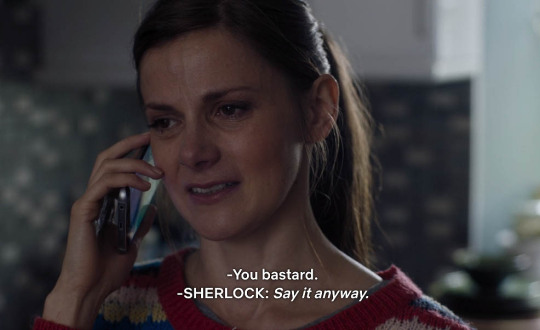
Result: It turns out that Molly (=John) won’t have any of this BS any more; it’s time for Sherlock to come clean.
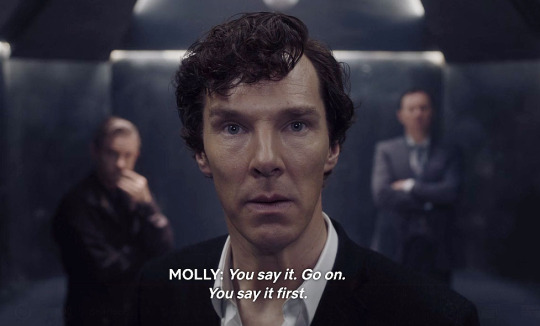
This is not about protecting John, or any other practical or ‘external’ reason for committing to him. It’s the point of no return, the moment of pure and simple honesty. “Tell John the truth” – that’s the mission. And finally, he does.
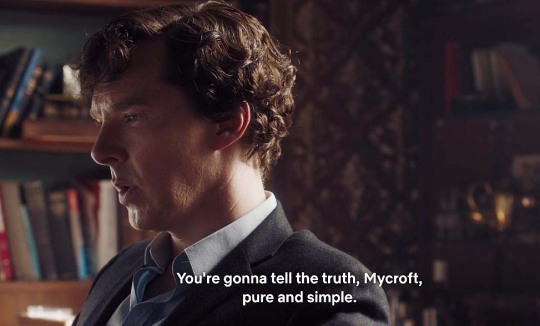
Discussion: This scenario is where I think the quote from Oscar Wilde might come in handy.
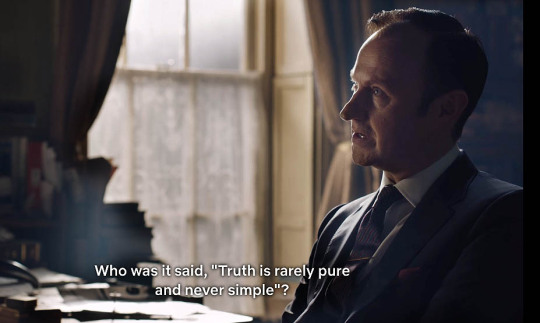
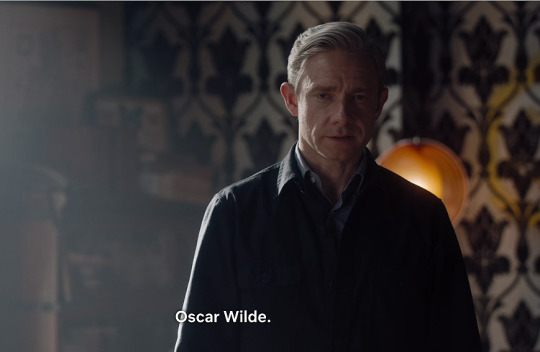
The title of the story that John, Mycroft and Sherlock are talking about is ‘The importance of being Earnest’. I’m not a native English speaker, but the word ‘earnest’ has several meanings, as far as I know. For example serious-minded, solemn, sober. But also heartfelt, sincere and impassioned. And Earnest is also the (false) name of the two protagonists in Wilde’s story, hence the wordplay in the title. In this work, Wilde is depicting two friends that keep lying about who they really are and what’s their real name, in order to escape social obligations. But the subtext is quite loud that this is rather about their relationship than the women they are (supposedly) courting.
The play premiered in London in 1895, the same year as Oscar Wilde was imprisoned and sentenced to two years of hard labour for “gross indecency” (= basically for being gay). And also the same year that has been re-hashed in this show since John’s blog got stuck on 1895 hits in ASiB.
Anyway, this scenario is a key point; it’s where I believe Sherlock finally breaks and starts allowing himself to feel and react emotionally. Sherlock sees 'I love you’ as a defeat and Eurus tells him that he has made more harm than good. But I think he’s on the right track now, because he’s letting himself feel.
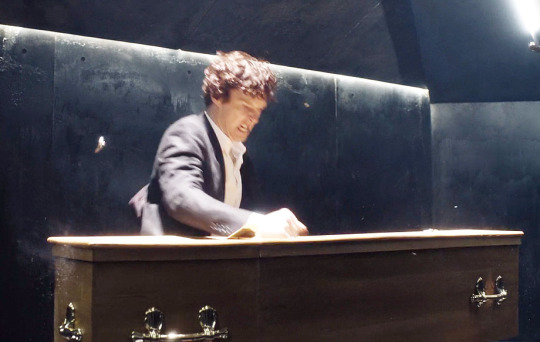
And smashing the coffin might mean that he has actually found the way to save John Watson. Save him from suicide, because that’s what I believe the coffin means, symbolically: the death of John.
TFP, Scenario 4: Heart or brain?
Inspiration: I’m not sure where exactly Sherlock draws from with this one, but this seems to be a nagging question that he has been wrestling with for some time now. In Eurus’ fourth experiment in Sherrinford, Sherlock still keeps playing the game on her terms, by accepting to choose between John and Mycroft; metaphorically heart vs brain. It seems like Sherlock has to either keep his brilliant brain and cut off his heart again, or go by his heart, which will make him lose his head and go insane.
[running the fourth model, involving a gun and a choice]
Result: For a moment, it looks like Sherlock is actually going to choose the heart option and shoot Mycroft, who tries to provoke him to do this. But Sherlock now - for the first time in this story - skips the game and goes for a third option instead: killing himself. Again. Which seems to very much be Moriarty’s (= homophobia’s) goal with this.
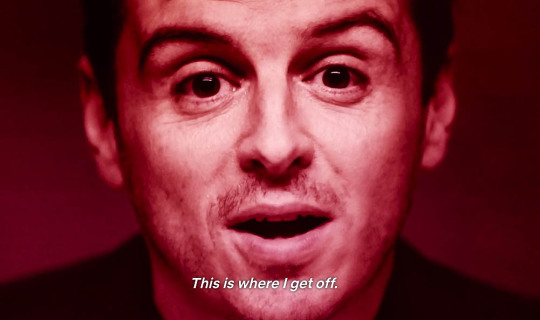
But it doesn’t work, because taking his own life is not the solution Eurus wants, so she doesn’t let him. Sherlock gets sedated, and his choice (to keep both brain and heart) only leads to another prison, where he’s surrounded by old family photos and a dog bowl (=memories). But breaking free from this and solving the Musgrave Ritual is (apparently) the solution.
Discussion: This choice could have been lengthy, but since Eurus (=Sherlock) aborts this scenario rather quickly, let’s just jump to the next one.
Scenario 5: How can Sherlock find the Truth?
The little girl on the plane, whom Sherlock has been trying to communicate with since early on in the episode, is lonely and desperate, and Sherlock is supposed to talk her down, to guide her towards the ground so she can land safely. But we also know that Mycroft (=Sherlock’s brain) was actually planning to let her crash the plane ‘for the greater good’ of other people’s safety.
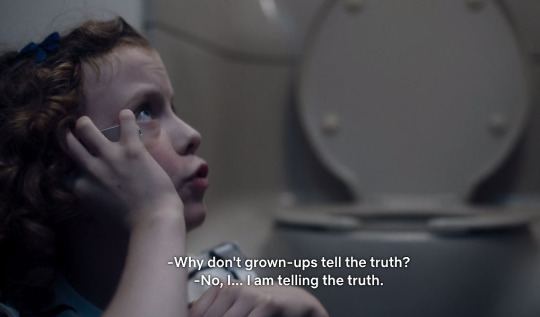
So, are you telling the truth, Sherlock? I’m not so sure about that actually... And did the grown-ups really tell you the truth about certain things when you were a kid? You do seem to doubt it.
Inspiration: Well, once again I suspect that Oscar Wilde might have been an inspiration for this experiment; “Truth is rarely pure and never simple”. But the girl on the plane might also be very much representing how Sherlock is feeling; he might have been withhold truth in his past, so he opted to seek for it himself, always, by using his brain and powers of deduction. But he feels alone and scared, up in his ‘ivory tower’.
[Running a scenario involving a puzzle based on Eurus’ song; is it the solution to this puzzle?]
Result: The little girl is, it turns out, actually Eurus (=Sherlock), who is feeling lost high up in the sky, unable to land with a sleeping driver. Finding Eurus’ “room” by solving the song puzzle means finding the truth. Which means Sherlock can finally save John from the well he’s drowning in.
Discussion: [Ironically enough, in the midst of all this (righteous) rage over the big ‘Purge’ of tumblr, I stumbled over something that I wonder if it’s not a double irony? Or a triple irony?

The thing is, that seeing this post about the tumblr censors flagging a 19:th century painting of the “Truth coming out of her well to shame mankind” (X), actually happened to give me something of an epiphany.]
This painting is from 1896 and it’s made by the French artist Jean-Léon Gérôme. You can read more about Gérôme’s work and see this and other of his paintings in this article here. This is the story (my bolding):
“At this time, Gérôme painted a series of works showing the personification of Truth. First, she was shown as a nude at the bottom of a well, either lying on the ground, or standing with a mirror in her hand.”
“Truth Coming out of her Well to Shame Mankind (1896) is based on a quotation from Democritus, “Of a truth we know nothing, for truth is in a well” (or, more literally, ‘in an abyss’), but knowing that reference is of little help in understanding these paintings. Gérôme had given one of the earlier paintings the title of Mendacibus et histrionibus occisa in puteo jacet alma Veritas, which translates as ‘The nurturer Truth lies in a well, having been killed by liars and actors’. In this last version, she has climbed out of the well, and instead of bearing the customary mirror, she brandishes a whip with which to scourge us.”
How many mirrors have we seen in this show by now? I think I lost count already in the unaired Pilot, but I wood guess at least some 50-ish. The point I want to make here, however, is that I believe the Truth Coming Out is central in BBC Sherlock. And in this fifth scenario we have two characters that are trapped in a well, keeping Truth hidden to the world:
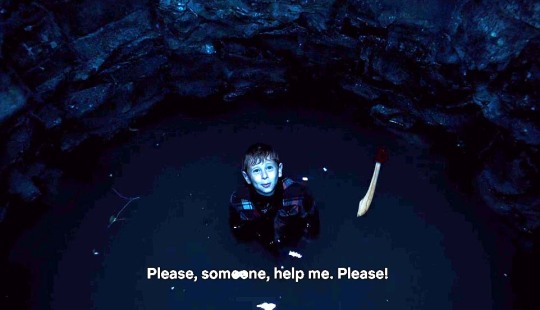
Young Victor Trevor (Sherlock’s mate from college in ACD canon)...
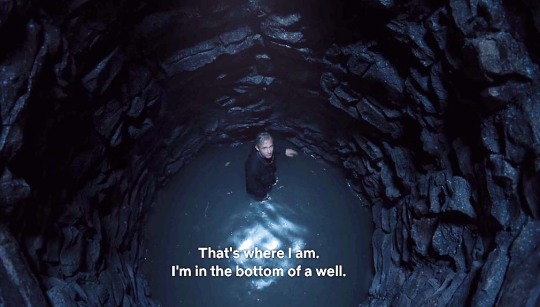
...and adult John Watson.
One of them never came out; he was ‘killed by liars and actors’, people who refused to see the Truth. So something might have happened with Victor, which contributed to Sherlock shutting down his emotions.
But the other one did come out, didn’t he?
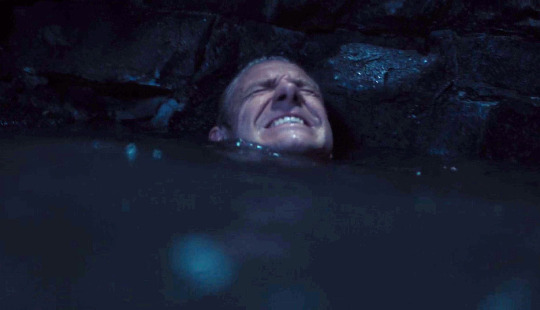
He literally did come out of his well, and he did it with Sherlock’s help. John isn’t exactly naked at the end of TFP, and he isn’t brandishing a whip (that’s Sherlock’s job - right? ;) ), so apparently John isn’t going to shame us. But John is indeed Sherlock’s Truth. If Sherlock is honest with himself, if he’s earnest, i think he must sooner or later admit exactly what John means to him. And John is wearing a blanket, just as Sherlock was after John Saved him in ASiP.
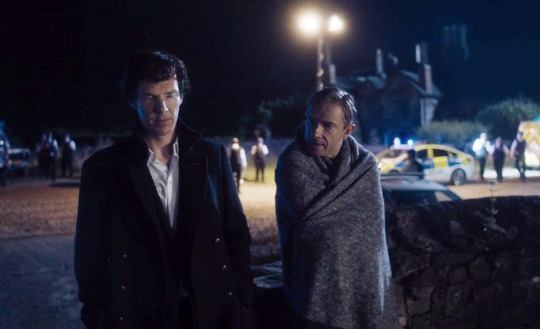
So if John is going to come out in S5, I think it’s perfectly foreshadowed here. And if he does, he’ll bring Truth with him, the true character of their relationship (which is also signaled by the codes of this episode). But it has to be with Sherlock’s help; Sherlock needs to take the first step to help him. This is the first time in S4 that Sherlock actually seems to manage to save John Watson. And he solves the puzzle by realizing that the girl on the plane is Eurus, who desperately needs a hug. Sherlock needs to embrace his own emotions, be OK with them and let them exist at the pair of his rational thinking.
Scenario #6: Does it matter who you really are?
Inspiration: A DVD is in focus here - not a memory stick this time - and it carries a message from ‘Mary’, just like the one at the end of TST, and the ‘unsolved’ (stabbed) case on Sherlock’s mantelpiece in TLD. But should Sherlock actually listen to her?
[The last scenario is a sort of ‘epilogue’ to the events in Sherrinford, where things seem to have ‘straightened up’ again.]
Result: After Musgrave, Eurus is locked up in Sherrinford again; apparently Sherlock still considers his emotional self as being too dangerous to let loose, and now she can’t even speak any more. But we also see Sherlock in a process of healing; he rebuilds 221B with the help of John, and he starts meeting Sister Sentiment regularly, communicating with her directly through the violin. And, as @loveismyrevolution commented here, the beautiful piece they are playing together is called “Who you really are”(X).
“What I try to say is that Sherlock’s emotions are that intense that they must be kept in charge and they are still locked within himself (Sherrinford), but he’s aware of them, is in contact with them, acknowledges them to the outside world and it makes him whole again”.
Discussion: 221B now has a slightly new dressing; some furniture have more rounded edges, and there’s an infant to take care of. Sherlock and John both seems happy with this. Both Greg and Molly pop in, and apparently Sherlock and John are solving crimes together again. But why is Mrs Hudson going around spraying the flat with aerosol?
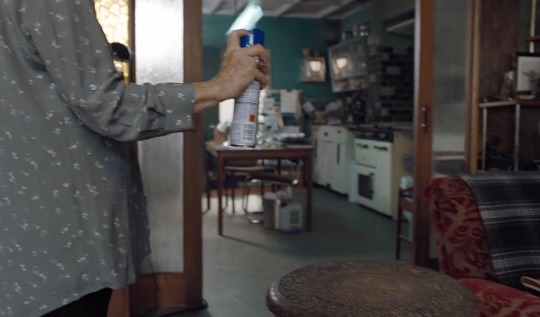
The last (and only) time we saw aerosol in this show was the poisonous, fear-inducing fog at Baskerville and Dewer’s Hollow in THoB. Does this mean that the poisonous homophobia is still around? (I’m going by the metaphors in @sagestreet‘s Follow-the-dog meta here, that the hallucinogenic fog in THoB represents homophobia). Well, to me it definitely seems so, since this important issue still isn’t addressed - far from it, actually. And what about Sherlock facing Death (=Appointment in Samara)? The skull on the wall still seems to be glowing in one of the dull colours it was displaying before 221B got blown up, and John still appears concerned:
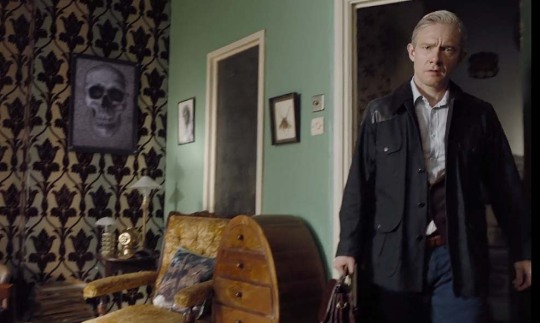
While I still believe, on both the meta level and as in-show ‘reality’, that the Holmes character is dying, at least Sherlock now seems to have faced his demons and thereby got in touch with his own, buried, emotions. But the scenario is very much dominated by ‘Mary’, whose message is two-edged:
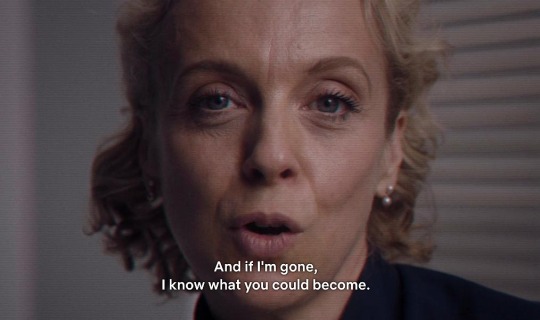
On the one hand she is hinting at what John and Sherlock could become without her. But on the other hand she claims that it doesn’t matter who they really are, and then she calls them “My Baker Street Boys”. Which I take to mean, that we could have our Holmes character two ways: Either we can keep it on a closeted, ‘myths-and-legends’ level as ‘Mary’ says, where Sherlock Holmes is an immortal, indestructible character. But if he can’t die, and he can’t fall in love, neither does he truly appear to be alive, right? The other option is that Sherlock and John need to get rid of her once and for all. Once 'Mary’s messages are no longer dominating, a time may come when Sherlock and John can become something very different from the emotionally repressed characters they remain until the end of this scenario, which has them frozen in time. They might actually come to life far more than in any adaptation this far. There’s a potential there, but also a threat. If it indeed matters ‘who you really are’, I believe this conflict has to be tackled in the next upcoming episodes.
OK, sorry for this meta-marathon, I hop it was at least barely readable. :) In the next installment I’ll analyse ‘Mary’s role more in-depth, trying to test predictions from this hypothesis:
Hypothesis #8. John is not the father of ‘Mary’s baby.
Tagging some people who might be interested: @raggedyblue @ebaeschnbliah @sarahthecoat @gosherlocked @loveismyrevolution @sagestreet @tjlcisthenewsexy @elldotsee @88thparallel @devoursjohnlock @sherlock-overflow-error
22 notes
·
View notes
Link
A Sherlock Holmes series that doesn't focus on Sherlock Holmes? Netflix's The Irregulars may be the latest adaptation of the famous super-sleuth created by Sir Arthur Conan Doyle, but in it he plays second fiddle to the Irregulars, a street gang of young adults with colorful pasts who have skills solving crime. Based on the Baker Street Irregulars, who featured in just a handful of Conan Doyle's stories, the group becomes Holmes and Watson's eyes and ears around a Victorian London bedeviled by supernatural situations.
RELATED: Enola Holmes - 5 Ways It's Similar To Sherlock (& 5 It's Like Robert Downey Jr's Sherlock Holmes)
Holmes is definitely an important character in the series, but he serves as part of its framework to allow the Irregulars to stand on their own. For some Holmes fans there won't be enough of the consulting detective, but for others, the Irregulars will be the vastly more fascinating protagonists.
10 Better: Stands On Its Own
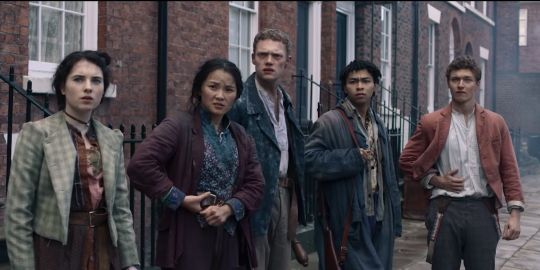
In the absence of the famous consulting detective, the series is able to stand apart from his narrative, its stories not eclipsed by the reputation of his own escapades. It can be known apart from everything to do with Holmes, from his scrimshaw pipe to his opium addiction.
By distancing itself from Holmes it can form its own identity, especially given that the Baker Street Irregulars don't feature in more than a handful of Holmes stories (two novels and one short story, to be exact).
9 Needs More: Too Confusing

The Irregulars aren't professionally contracted by Holmes himself but his associate John Watson. In Sir Arthur Conan Doyle's novels, Holmes is world-famous, the stories Watson pens being widely circulated, so for Bea and the others to have no idea the significance of his name when mentioned by either Watson or Mycroft Holmes is extremely strange.
RELATED: Sherlock - Every Book Case Referenced By The BBC Show
The gang first encounters Holmes when Spike sneaks into his room at 221B Baker Street and a drunken figure flops down on the bed he's hiding under. Longtime fans know it's Holmes because he immediately begins to play his violin, but casual fans are left simply confused. Since his character isn't a consulting detective anymore, his presence proves more often a burden to the gang than a help.
8 Better: More Creative Freedom And Perspective
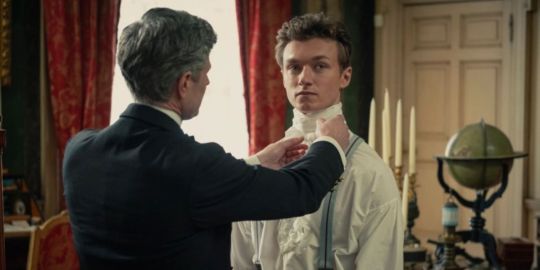
Holmes' adventures have been well-documented according to Sir Arthur Conan Doyle's fictional narrator and Holmes' biographer, John Watson. With The Irregulars choosing to base their cases on narratives apart from the structure of Watson's writings, they have more creative license to pursue stories that don't intersect with his. They can even, in the case of Leopold, interpret real historical figures in a creative way.
As an added bonus, they aren't confined to the environs of Holmes' socio-economic status. That is to say, the gentlemen's clubs, the parlors of the extremely wealthy, and wherever else a man of Holmes' means would frequent. Their perspective is as impoverished, resourceful people of the street, something Holmes knew very little about (unless he was undercover himself, but even then could only mimic).
7 Needs More: More Structure

With a defining protagonist like Sherlock Holmes, cases take on a specific structure in accordance to the short stories presented by John Watson. He's approached by a client, he decides whether or not to take the case based on a combination of financial need and personal intellectual interest, then proceeds to solve it.
RELATED: Henry Cavill And 9 Best Actors Who Have Played Sherlock Holmes
Without the mechanics of that dependable system, the series is a little chaotic, with it being somewhat unclear why the Irregulars are in any way important. Other than their clairvoyant member Jessica, none of them seem to be of particular use to their clients.
6 Better: More Room For Interesting Characters
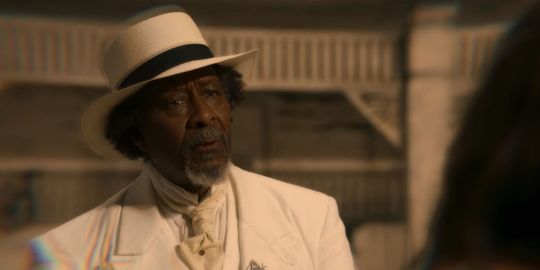
While a remarkable figure in his own right (not to mention the prevailing basis for many popular characters, including Doctor Gregory House of House), less of Holmes means more of the Irregulars, with their eccentricities and personalities being given full attention.
This also includes more time focused on his older brother Mycroft Holmes (who only features in a handful of the Holmes canon), John Watson, Mrs. Hudson, as well as supernatural figures like the Linen Man and entities drifting around Victorian London at the time.
5 Needs More: He's A Fascinating Protagonist

There's a reason that Sherlock Holmes stories have remained popular for more than 100 years and have never been out of print; he's a remarkable character and a fascinating protagonist. He's routinely selected as the most famous character in all of literature, and adventures have been translated into dozens of languages around the world.
While there have been two excellent series featuring the character (Sherlock and Elementary), they've both placed the world's greatest consulting detective in the modern era, whereas it's been decades since he's been allowed to flourish in the historical period in which he was written.
4 Better: He Has His Own Media

Given the popularity of Sherlock Holmes as a character, he's recently seen somewhat of a resurgence in the current zeitgeist. Aside from the successful Sherlock Holmes films starring Robert Downey Jr. as Sherlock Holmes and Jude Law as Dr. Watson, he's also appeared in series like Sherlock with Benedict Cumberbatch and Elementary with Jonny Lee Miller.
RELATED: Robert Downey Jr.'s Sherlock Holmes 3 - 5 Stories It Could Adapt (& 5 Ways It Can Follow On From A Game Of Shadows)
With a third movie starring Robert Downey Jr. currently in production, it's perhaps a better time to highlight the characters that dwell in Holmes' world, like the Irregulars. Holmes media will keep being made, but a series based on his Baker Street brood may only have this one chance to gain traction.
3 Needs More: Adds Legitimacy
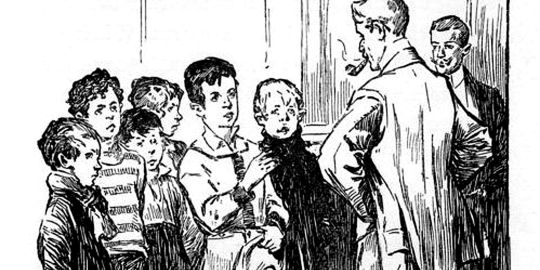
As the series struggles to find its footing, having a much-beloved literary character like Sherlock Holmes might help it find its footing. Much like Krypton without Superman, it may divide its fanbase if it doesn't keep finding ways to connect to its inspirational source material.
In other words, for The Irregulars to be taken seriously as a show, it may need -at least for the foreseeable future- more tie-ins to Holmes in order to gain a suitable foundation.
2 Better: More Diversity

The television landscape may not need another white male protagonist with wealth, social standing, and superior powers of observation. Without Holmes, characters like Beatrice (played by Chinese-born Northern Irish actress Thaddea Graham) can have the spotlight as the leader of the group of crime fighters.
There are also more female characters in general than in a typical Holmes story, and they are of greater importance to the plot. John Watson has also been changed in significant ways, making Holmes seem less relevant by what he represents.
1 Needs More: Chance For Another Interpretation
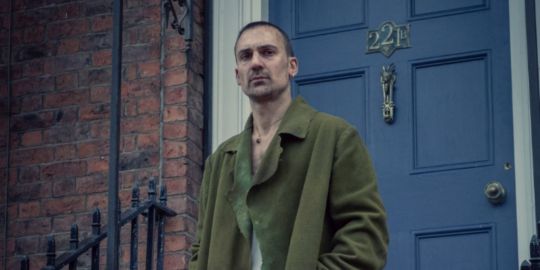
Given the recent success of Enola Holmes in which Henry Cavill unexpectedly portrayed Holmes as a soft-spoken and physically robust sleuth, there's been cause among fans to desire a different interpretation of the character in new media.
This Holmes is an occult-loving, top-knot-wearing, rakish Bohemian alongside a Watson that has much more in common with the traditional Holmes archetype. The Irregulars featuring more of Sherlock Holmes would allow for yet another unconventional depiction to be celebrated.
NEXT: 5 Reasons Henry Cavill Should Have His Own Sherlock Series (& 5 He Shouldn't)
The Irregulars: 5 Ways It's Better With Less Sherlock Holmes (& 5 Reasons It Needs More) from https://ift.tt/3wrcS6z
1 note
·
View note
Text
@cansprainpeople
john is well on his way to being inebriated too, his hand wrapping around the handle of his glass ( though he didn’t have a sherri to refill his drinks faster than he could drink something ) and taking a long sip. one’s stag night was supposed to mean that you shut off all communication with your significant other, but that was not going to happen with sherrinford planning sherlock’s. no one knew what those two would get into & he was willing to bet that the detective inspector next to him had his mobile close by as well. with rosie safe with mrs. hudson, he was able to fully relax, roll his shoulders backwards, and accept another pint from greg. There’s a rugby match on the telly above & mike is too busy throwing peanuts at it to really listen to their conversation. When his text tone goes off, there’s a dopey look on his face, ears getting a little red as he reads sherlock’s words. lestrade catches his eye & he can see the detective inspector rolling his eyes. “ the missus trying to get you home already john? “ a scoff followed by another sip of his lagger. “ oh bugger off. if i want to talk to my fiancee, i will do just that. “there’s the lingering thought in his mind that soon it would be, ‘if i want to talk to my husband.’ the thought makes him feel warm on the inside. it had been a long time coming.
( sms; sherlock holmes ) in less than twenty four hours, we’ll be married
( sms; sherlock holmes ) it’s safe to say that you are on my mind too.
He could already hear the sound of his sister GROANING to his brother at the sight of his phone. The night was still young ( especially in the eyes of Sherrinford ), & the parlor of Mycroft’s house held only a FEW faces. It wasn’t depressing though. Sherlock had almost not partaken in the STAG NIGHT tradition due to a combination of memories from the last one & a sense of POINTLESSLY becoming plastered hours before what was sure to be the busiest & organized chaotic day of his life. It was Sherrinford’s INSISTENCE that he do this; taking the reins from his brother ( who was far too eager to not to have to do anything but contain the chaos ). Sherlock hadn’t felt the need to surround himself with a large group of people he would be seeing far TOO much of tomorrow.
So he kept it to the MINIMUM; which here meant that it was just the Holmes siblings ( with one obvious exception ). Mycroft’s home being chosen as the base simply to FREE him from a night of hosting their parents ( who were currently at Baker Street with Rosie & Mrs. Hudson ). A few hours had passed, Sherlock had been given only one drink - however it was a SHERRINFORD HOLMES DRINK, which this time had proven to be a glass filled with MULTIPLE shots of Tequila & had been forced upon him as a SINGLE SHOT. Mycroft had protested loudly against this, which had only encouraged his defiant streak & now he was slumped over in an armchair as he attempted to keep up with Sherri’s RAMBLINGS & Mycroft’s teasing ( but NOT unkind ) QUIPS in his now less than sober brain. The SMILE that came to his face when his phone chimed prompted BOTH his siblings to roll their eyes & turn towards their game of DEDUCTIONS.

{ sms - john watson. } I’m bored. { sms - john watson. } And I m iss you. This 24hours apa rt thing was stupi d. { sms - john watson. } I am officially cancellin git. Meet me smwheere
#( sherlock ur texting is a hot mess. stop it )#( sbv: and if my yesterday is a disgrace tell that you’ll still recall my name. )#( au: people always stop after three. )#ʟᴇᴀᴅ ᴍᴇ ᴛᴏ ᴡᴀʀ ᴡɪᴛʜ ʏᴏᴜʀ ʙʀɪʟʟɪᴀɴᴛ ᴅɪʀᴇᴄᴛɪᴏɴ ﹣﹣﹣ ﹙ john watson. ﹚#cansprainpeople#strongmoralprinciple
9 notes
·
View notes